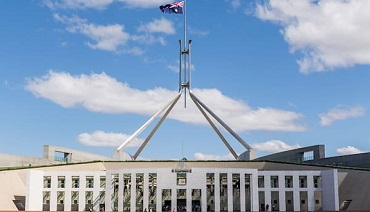The Australian Alert Service is the weekly publication of the Australian Citizens Party.
It will keep you updated on strategic events both in Australia, and worldwide, as well as the organising activities of the Citizens Party.
To subscribe to the Australian Alert Service, it's easy, and it's secure.
Lead Editorial
21 June 2023
Vol. 25 No. 25
This week in Canberra, the Parliament is considering issues which the Australian Citizens Party has played a major role in forcing on to the political agenda.
Behind the scenes, there is growing support for a public bank as the solution to many of Australia’s pressing economic problems, including:
- a national post office People’s Bank to guarantee banking services for the communities being abandoned by the major banks;
- a development bank to invest in critical infrastructure, such as the desperately needed public housing that is currently a political football (Ben Chifley used the Commonwealth bank to fund state Housing Commissions to expand public housing by 90,000 in 1945-54);
- repurposing the Reserve Bank as a national bank to address the acute mortgage debt crisis crushing Australian households.
Queensland University of Technology finance lecturer Dr Mark McGovern’s submission to the Senate inquiry into bank closures in regional Australia, published on the inquiry website as number 486 (available to download), touches on what the RBA could do to alleviate Australia’s crushing debt problems. And underlining the growing global support for the public bank solution, last week US Congressman Danny Davis introduced a bill in the House of Representatives, HR 4052, for a US$5 trillion National Infrastructure Bank.
On Thursday, 22 June, the Senate Rural and Regional Affairs and Transport References Committee will hold a hearing on Project Iron Boomerang, the visionary development idea to connect Western Australia’s iron ore deposits with Queensland’s coking coal deposits via a 4,000 km railway, to supply steel mills at both ends. The ACP has worked very hard to promote this project, knowing it is exactly what is needed to reindustrialise the nation so Australia can rise from the debt-laden ashes of the casino economy into which we degenerated under neoliberal policies. But it isn’t just political pie in the sky—a great idea that politicians will be too small-minded to embrace—it is starting to win the support of key people in the Labor government, and this week’s hearing will be crucial to the success of the inquiry. The ACP will be in attendance for the hearing in Canberra.
The ACP will also be present at the Senate Economics Committee’s hearing on Friday on the Australian Securities and Investments Commission (ASIC). The ACP strongly supported independent economist John Adams’ work to expose ASIC’s investigation and enforcement failings, and the subsequent Inquiry Liberal Senator Andrew Bragg established last October. But in eight months the inquiry has effectively done nothing, so this week the ACP felt compelled to set a fire under it by issuing a press release titled “Senator Bragg’s ASIC inquiry must do better”, which cited the inquiry’s treatment of bank victims Wayne Ditchburn and his partner Rowena (p. 3).
The ACP’s release was perfectly timed: later that day, Senator Bragg issued a statement effectively declaring war on ASIC over its obstruction of the Committee’s inquiry. Bragg announced he will be referring ASIC to the Senate’s Privileges Committee, which is the powerful law enforcement arm of Parliament that can hold people in contempt and even, in extreme circumstances, has the power to jail people. The 20 June Australian Financial Review reported: “But economist John Adams—whose report that ASIC investigates fewer than one per cent of complaints received helped spark the inquiry—shared the concern of the Citizens Party that Senator Bragg’s inquiry was being stonewalled. … Mr Adams recently obtained Freedom of Information documents which revealed that Treasury officials concluded that his claims about ASIC’s enforcement record were ‘substantially correct’.”
The ACP has focused on ASIC because it has been a big part of the radical shift of Australia’s broader financial system following the privatisation of the Commonwealth Bank, from (mostly, with some exceptions) serving people and investing in the real economy, to fleecing people and looting the real economy, which we must reverse.
ACP pressure is forcing Canberra to address all these issues.
In this issue:
- Senator Bragg’s ASIC inquiry must do better
- Australia’s designation as ‘domestic source’ for US defence industry foreshadows further erosion of sovereignty
- ‘Enough is enough’ is not good enough—Escalate pressure on politicians to free Assange
- Is the Attorney-General persecuting an Australian political prisoner under orders from Washington?
- Shirtfronting Australia
- Behind the railroading of Assange: the ‘Special Relationship’
- Sub-Imperial Power: Australia in the International Arena
- Ukraine: Taking leave of our senses
- The Non-Aligned Movement rises again, for peace and development
- ACP’s ideas emerge on many fronts
- 80 per cent Afghan opium ‘bad for world’?
- ALMANAC: Return to the high-water mark of banking (Part II)
Click here to find out how to subscribe. For freely available AAS articles, click here.
Click here for the archive of previous issues of the Australian Alert Service








